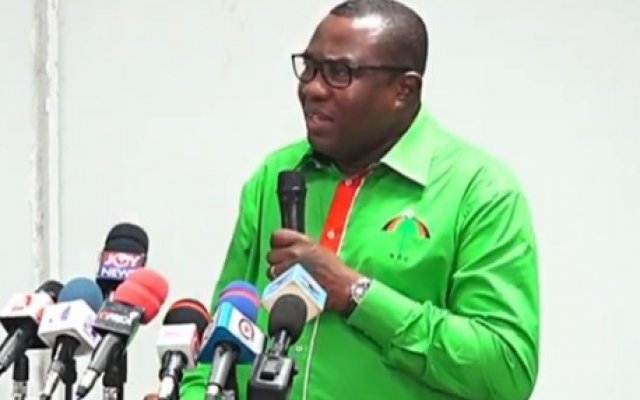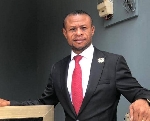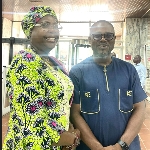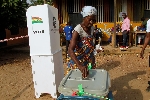Let UN, AU, ECOWAS help us disband militias – NDC to Akufo-Addo

President Akufo-Addo was the first to make the initiative towards disbanding the groups when he appealed to the two parties, during his third state of the nation address, to sit at the table to fashion out a strategy to deal with their militias.
The NDC, in its first letter to the president on the subject matter, said there was the need for a neutral mediator such as the country’s National Peace Council. In the president’s response to the first NDC letter, he said there was no need for such a mediator since the problem is owned by the two main parties, thus, the two alone must sit to discuss the matter and find a solution to it.
The NDC, however, is not shifting from its request for a mediator.
In its second letter to the president signed by national chairman Samuel Ofosu-Ampofo, the party said: “Our attempt at a solution that goes beyond the legal process would be of interest to institutions involved in ensuring peaceful development across Africa. These include ECOWAS, the AU and various UN agencies. Ghana is a member of these bodies and is entitled to call on their resources to assist in resolving critical problems. This is not in any way a surrender of our sovereignty or a declaration of a lack of faith in our own abilities. We see it rather as an act of responsible regional and international citizenship and transparency.”
“Your Excellency, our position on facilitation flows logically from our position on participation. We are not looking at a principally juridical process. As indicated, we envisage a large and complex citizens’ process. There will be several different stakeholders with different perspectives and priorities. The process itself will involve elements of goal-setting, fact-finding, confidence-building, reconciliation, policy prescription and mobilisation of public opinion,” Ofosu Ampofo said in the letter”.
Below are excerpts of the NDC’s second letter
Scope of Participation
Your Excellency, our letter did not call for CSOs and other proposed participants to disband their militias. We obviously did not suggest that the National Peace Council has an armed militia. We rather called for wider participation in a citizens’ process to end organised political violence. Our position on participation is actually quite simple: a lasting solution to the crisis of political violence requires that we involve all stakeholders. This is generally accepted as good practice.
We define stakeholders to include all those who are affected by a policy; all those who will be involved in policy implementation; and all those who by dint of their work or expertise in the relevant area of policy have informed perspectives to contribute to policymaking. The stakeholders in the struggle against political violence cannot reasonably be limited to the two largest political parties.
The list of stakeholders we proposed can, of course, be tightened or expanded. We however think it would be a tragedy to go forward on the narrow basis of only the two major political parties considering the gravity of the matters to be considered and the danger that the threat of unregulated use of force by unauthorised armed groups poses to civil society and, indeed, to those who bear arms lawfully as mandated by the 1992 4th Republican Constitution of which you are the principal guardian.
Facilitation
Your Excellency, our position on facilitation flows logically from our position on participation. We are not looking at a principally juridical process. As indicated, we envisage a large and complex citizens’ process. There will be several different stakeholders with different perspectives and priorities. The process itself will involve elements of goal-setting, fact-finding, confidence-building, reconciliation, policy prescription and mobilisation of public opinion.
These may require a combination of different approaches, techniques, and skills. With such complex processes, there is a need to involve institutions or experts who specialise in process facilitation. This involves expertise in both the logical and psychological sub-processes required. Professional facilitators can ensure that all participants listen and are heard; that different perspectives and proposals are properly evaluated; that conflicts are analysed and understood; that individuals and institutional participants do not feel attacked; and that effective consensus is built towards clear actionable outcomes – all within a reasonable time frame.
The sad fact is that this expertise does not reside in any meaningful way in the current political establishment as much as it does in civil society and in the international community. Indeed, a significant element of the crisis we currently face is the winner-takes-all culture of our national politics.
Your Excellency, NDC and NPP have indeed been the most successful parties of the 4th Republic and have an absolutely critical role to play in achieving the change of direction needed. This can be reflected in the process we develop for this initiative. However, Your Excellency, our parties do not begin to represent the full scope of Ghanaian opinion as your letter suggests.
The same forces that protect prominent politicians are engaged in communal violence around chieftaincy disputes.
It is precisely this stark reality that provides a compelling and persuasive argument that our two great parties cannot do it alone and that we need important assistance from the wider society to achieve lasting verifiable solutions that will assure peace and security to our citizens, our parties and our nation.
Your Excellency, we note also that the problems we face in Ghana exist to a greater or lesser degree in many other countries.
Your Excellency, it would be easy to test your belief that Ghanaians are happy to leave the question of political violence to be resolved bilaterally by NDC and NPP. We respectfully request that you invite the public and entities such as the Ghana Peace Council or the various expert institutions to weigh in on this debate. We have already begun to sound out other stakeholders and believe that there is considerable interest in participating in a process such as we have described.
Source: Ghana/ClassFMmonline.com/91.3FM
Source: Patrick Ayumu
Trending News

Deputy Minister expresses relief over progress in resolving Bawku conflict
12:02
Supreme Court halts Kpandai rerun pending determination of Nyindam’s application
12:15
Global InfoAnalytics poll gives NPP’s Nyindam narrow edge ahead of Kpandai rerun
07:20
Daddy Lumba’s funeral in limbo as court grants injunction to maternal family
12:19
Ghana would be living its best life without Minority in Parliament — Adama Suleman fires
12:06
Prez. Mahama sends Ghanaian troops to aid Jamaica’s recovery
11:48
President Mahama hosts farewell meeting for outgoing Palestinian Ambassador
12:10
Unemployed Environmental Health officers to demonstrate today Dec.15 over years of joblessness
07:10
GTA Deputy CEO praises Hajia Zuwera Ibrahimah as a trailblazer in Ghana’s Parliament
11:52
Frequent election reruns undermining confidence — Election Watch Ghana
11:54



